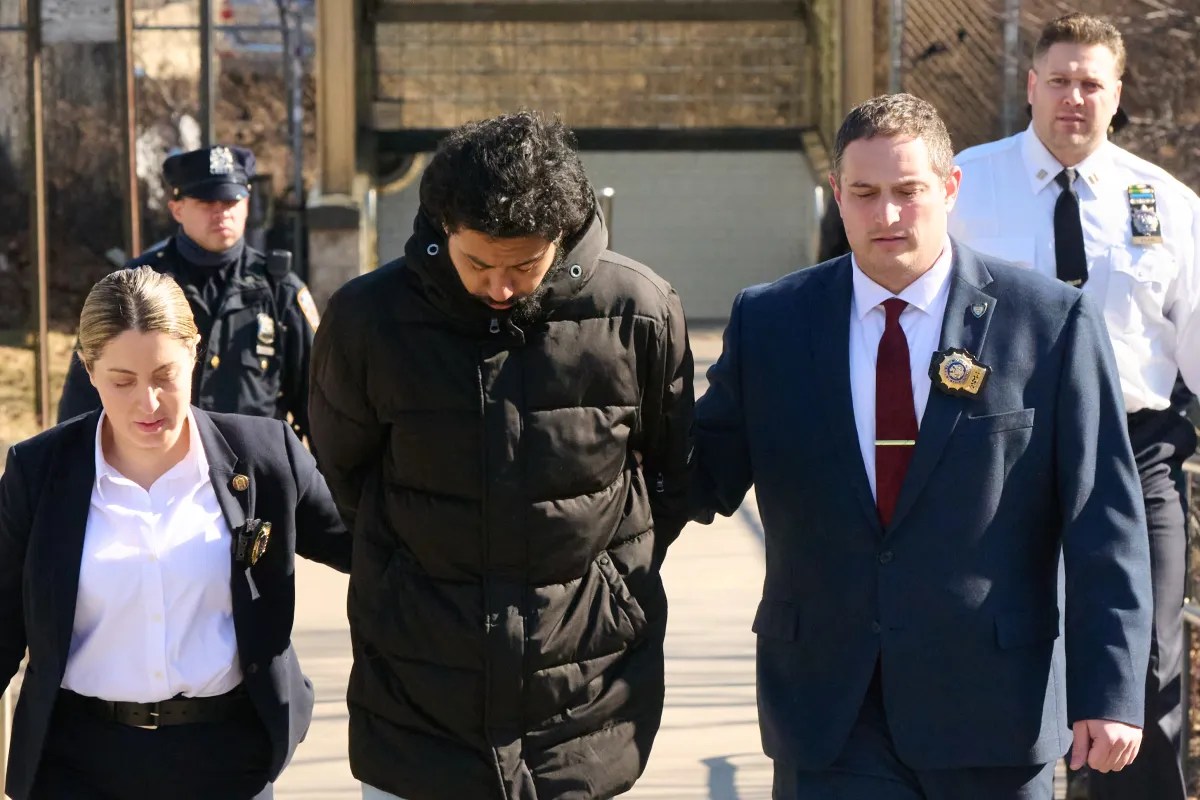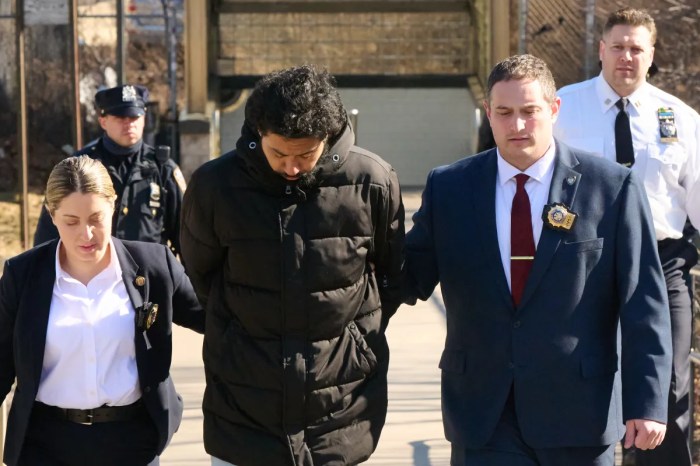By JERRY TALLMER
Coming off the ice, tall, strapping Eric Strezenc of the Black team wisecracked jock-ularly to Nick Springer of the Orange team: “You held me, out there — twice.”
Springer, at 18 the youngest man on either team, gave a snort. “I couldn’t hold you,” the husky kid said. “I got no hands.”
And it’s true. Eric Strezenc, a Long Islander in his 30s, has only one leg, and various other players in the slambang celebrity-sprinkled sled-hockey game at Sky Rink in Chelsea Piers on Oct. 27 lacked one leg or both legs. But Nick Springer was the only contestant with no legs, no hands. He lost them to meningococcal meningitis four years ago, when he was 14.
The game, strenuously fought for two 30-minute halves by whirring, speeding, slashing contestants, had ended in a 3-2 victory for the Black team — Strezenc’s team. But young Springer’s immediate comment was: “Personally, I think we played a hell of a good game, and that’s all that counts.”
This was while his father was unlacing the hockey sticks from each of Nick’s foreshortened arms. Sled-hockey is ice hockey played on low, one-man sleds, and the hockey sticks, which bear a certain odd resemblance to old-fashioned, long-barreled pistols, have metal teeth at one end to grip the ice and a narrow paddle at the other with which to slap the puck
Nick’s father also pulls off over the boy’s head the orange sweatshirt with the big number 8 in back, and a dark sweater that was underneath. The all-but-naked kid who now bounces and twists himself off his sled has the chest and shoulders of a middleweight wrestler.
The crowd, during the match, had enthusiastically followed the on-ice contributions of such former hockey greats as Rick Middleton, Terry O’Reilly and Rod Gilbert, all-time high scorer of the New York Rangers, as well as such non-hockey acting talent as Paul D’Amato, Elka Walker and Brendan (“George of the Jungle”) Fraser.
“He did better in the jungle,” said spectator Dan Levine as Fraser, Orange team number 6, swayed this way and that way on his sled before being spilled on his tuchas by Nick Springer. Levine’s son Dylan, watching but not playing, is, at 11, a leg-impaired sled-hockey ace in his own right.
“We mixed the disabled and the able-bodied all together on the two teams because we figured it was fairer that way,” said Nick’s father. He’s Gary Springer, film and theater publicist, son of the late, much-loved publicist-to-the-stars John Springer. Two of the keenest onlookers in the bleachers are, of course, June Springer, grandmother of Nick, and Nancy Springer, mother of Nick.
“Sled-hockey is just like able-bodied hockey, the only difference is you sit down,” said Black team captain Victor Calise, 31, who lost the use of his legs in a downhill-mountain bicycle accident nine years ago. He has also been heard to say: “The only difference is the way you tie up your skates.”
An executive with the Eastern Paralyzed Veterans Association, Calise put sled-hockeying onto the map with the help of that organization and the New York Islanders three years ago. “It’s more competitive than recreational,” he wants the world to know. Sled-hockey is now a regular event in the Para-Olympics that parallel the Olympics themselves.
It was Rod Gilbert, a longtime friend of Gary Springer, who first taught Nick, then age 6, to get up on skates for the kind of hockey the Rangers play. Now, at the Sky Rink of Chelsea Piers, Gilbert lets it be known that the 6-year-old who showed early ability as a hockey player has just proved “he has the guts to have been a star.”
“Well,” said that young man, “Rod Gilbert is just a good buddy of mine, through my dad.” Nick, who also goes in for wheelchair rugby and long-distance (three-wheel) biking, took up sled-hockey two years ago. “Actually I had so much knowledge of the sport, it makes it easier.”
Nick Springer was away at camp in the Berkshires when the meningitis hit him in August 1999. It’s a disease that clusters in schools, camps, colleges. About a third of the people so hit either die or suffer severe brain damage. Blood pressure goes to near zero; instant intravenous treatment and ruthless amputation may or may not save a life. In Nick’s case, after six weeks and 17 operations, it did.
This past August, Nick and his mother went up to Massachusetts to testify before a state Health Committee on behalf of legislation “to protect children in camps or colleges,” said Nancy Springer, “against the bacterial meningitis he had.”
The legislation will — hopefully, state by state — make it mandatory for parents to at least read and sign an informational paper on the vaccinations that can deter or prevent four varieties of the meningitis. “And we now have a Web site,” said Nick’s mother. “It’s www.nmaus.org.”
Said 18-year-old Nick Springer, without apology: “I guess I’m pretty good at persuading people, putting them in my place.”
If you were in his place last month, you would have bicycled 50 miles a day for three days from this city to Washington, D.C., as a memorial to September 11, 2001. And if you were in Nick Springer’s place the day after the night of the Gotham magazine and New York Observer all-star sled-hockey game at Chelsea Piers, you would have been getting up and going off to Croton High School at the crack of dawn. As Rod Gilbert said, the kid’s got guts.







































